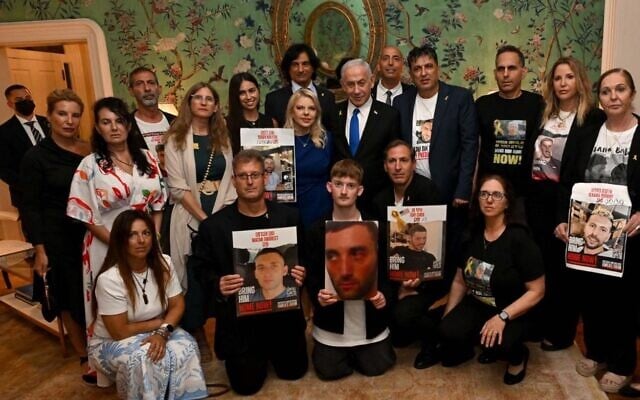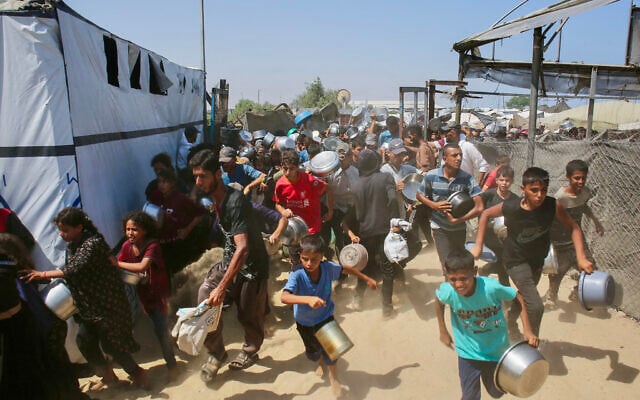



US special envoy to the Mideast Steve Witkoff hopes to travel to Doha by the end of the week to finalize a Gaza ceasefire and hostage release deal between Israel and Hamas, a source involved in the mediation effort said on Tuesday.
The source spoke to The Times of Israel shortly after US State Department spokesperson Tammy Bruce announced that US Secretary of State Marco Rubio had just informed her that Witkoff was already en route to the region and that Washington had high hopes for an agreement.
Witkoff “is heading to the region now — to the Gaza area,” Bruce said in a briefing with reporters. When pressed as to where exactly Witkoff was heading, she said that Rubio had not given her specifics.
But the source involved in the mediation effort said that Witkoff was actually still in the US and was only slated to depart on Wednesday — but for meetings in Europe, not Qatar where ongoing proximity talks have been taking place.
Witkoff’s presence in Doha has been framed as an indicator that talks are nearing a conclusion, as negotiators have said he only wants to join the negotiations when they reach a point at which they are ready for an agreement to be announced.
Also Tuesday, Prime Minister Benjamin Netanyahu held a situational assessment with the Israeli negotiating team in Doha, an Israeli official told reporters.
On Wednesday, a delegation of former hostages is slated to meet with senior Trump administration officials in Washington.
Proximity negotiations have been taking place since July 6, with the deal on the table envisioning the release of 10 living hostages and the bodies of 18 slain hostages in exchange for a yet-to-be-agreed-upon number of Palestinian security prisoners during a 60-day truce. Once the temporary ceasefire commences, the sides will hold talks on the terms of a permanent ceasefire and the release of the remaining 22 hostages, around 10 of whom are believed to be alive.
Mediators expressed optimism last week about the chances for an imminent deal after Israel agreed to back off from demands regarding the scope of its troop presence in Gaza during the two-month truce. Since then, however, Hamas has been accused of dragging its feet in responding to the latest Israeli concessions and had yet to do so as of late Tuesday night, the source said.
Earlier in the week, the terror group claimed to mediators that it was unable to reach its leaders in Gaza, but that appeared to have been a stalling tactic, the source said, adding that mediators warned Hamas the US would withdraw its guarantees to keep Israel at the table during talks on a permanent ceasefire if the terror group didn’t respond constructively soon.
Still, an Arab diplomat familiar with the talks said the overall trajectory is positive and that a deal is possible within the coming days.
However, due to the delay in Hamas’s response, the sides have not held advanced negotiations regarding the identities of the security prisoners slated for release, the source said, acknowledging that an announcement about a deal being reached by the end of this week may be difficult.
The identity of the hostages who will be freed must also be determined, with Netanyahu earlier this month telling families of captives that Hamas will choose who to release. Two sources told the Haaretz daily however that intelligence on the conditions of the hostages is being given to Netanyahu’s office, and that Israel’s political leadership will decide on the order of release.
Bruce said Tuesday that the ceasefire deal under discussion will also include the establishment of a new humanitarian corridor to securely surge aid into Gaza.
She appeared to be referring to a separate track of negotiations that have been taking place in Cairo between Israeli and Egyptian negotiators to come up with a new mechanism for aid distribution during the truce.
The source said on Monday that those talks have been progressing well and that a meeting was being planned for Tuesday between Egyptian, Israeli, and UN officials to discuss the new mechanism. The goal is to move away from the Gaza Humanitarian Foundation, while still satisfying Israel, which argues that Hamas has exploited existing UN distribution mechanisms to divert aid, the source said.
Hamas has opposed GHF in what Israel says proves that the US- and Israeli-backed organization is effective in boxing the terror group out of the aid distribution process.
International aid organizations have also come out against GHF as its mechanism for aid distribution has forced Palestinians to walk long distances, while frequently dodging IDF fire in order to pick up aid.
While GHF has touted distribution of what it says has been roughly 85 million meals in roughly two months, the boxes it hands out are filled with dry food products that still need to be prepared elsewhere in a war-ravaged Strip with scarce clean water, cooking fuel or equipment.
Hamas-run health authorities in Gaza said earlier Tuesday that an unprecedented 20 Palestinians had died from starvation in the past two days, as concern about a metastasizing problem mounted.
Regional stakeholders have urged Israel to allow the Palestinian Authority to gain a foothold in Gaza, including in the aid distribution process. Netanyahu has rejected the idea outright, likening the PA to Hamas. The failure to stand up a viable governing alternative however has resulted in chaos and lawlessness filling the vacuums created by Israel’s depletion of Hamas’s military and governing capabilities.
Lazar Berman contributed to this report.


